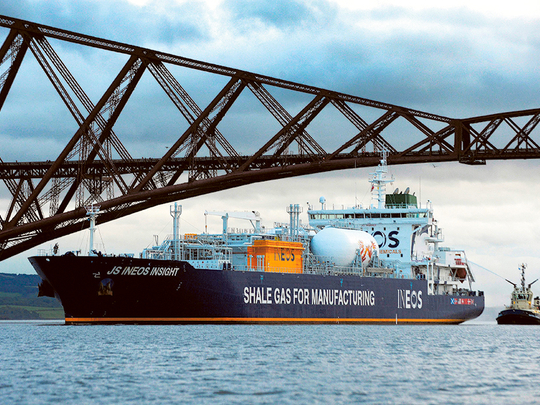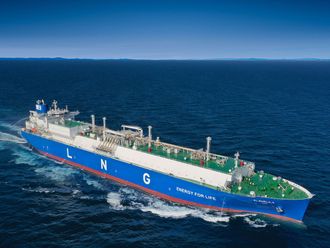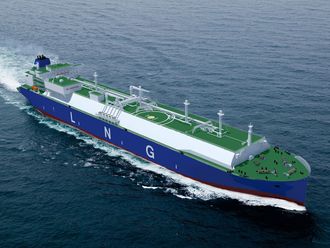
Grangemouth, United Kingdom: A tanker carrying the first shipment of shale gas from the United States arrived on Tuesday in Britain, where there are currently no commercial fracking operations because of fierce public opposition.
The ship arrived at Grangemouth, a sprawling energy complex on the River Forth near Edinburgh in Scotland, where the North Sea offshore oil and gas reserves are becoming too costly to extract.
The carrier, transporting 27,500 cubic metres of ethane, was given a traditional Scottish welcome, passing under the Forth’s iconic 19th century steel rail bridge as a lone bagpiper played from the ship.
A £2 billion (Dh9.51 billion) investment by Ineos, the world’s third largest chemical company, will create a “virtual pipeline” with eight tankers transporting regular shipments across the Atlantic to Britain and Norway.
The gas from Pennsylvania will replace dwindling offshore supplies which once flowed in abundance from the North Sea but have become increasingly difficult to extract as wells have matured.
North Sea oil production hit a record low last year as the global oil price plummeted.
A new shipment of gas will arrive every three weeks at Grangemouth, where it will be broken down using a chemical process called “cracking” and used to make plastics for bottles, pipes, cabling, insulation, food packaging and pharmaceutical equipment.
The deal is expected to support thousands of jobs in Scotland but the controversial method of extracting the gas, known as hydraulic fracturing or “fracking”, has divided political opinion and caused a headache for Scottish First Minister Nicola Sturgeon.
Scotland has a moratorium on fracking. While the British government has given the go-ahead for projects in the rest of the country, none are currently underway often because of lengthy local planning procedures and legal action.
One project won approval in May as councillors in Yorkshire gave the go-ahead to a plan by shale company Third Energy but work has yet to begin.
Ineos chairman Jim Ratcliffe said the import deal has secured the future of Grangemouth, which was on the brink of closure only a few years ago.
“This is a hugely important day for Ineos and the UK. Shale gas can help stop the decline of British manufacturing and today is first step in that direction,” Ratcliffe said.
Ratcliffe has accused the Scottish government of “hypocrisy” by brokering a deal to save the plant but then leaving it dependent on US imports by refusing to allow fracking in Scotland.
Think tank Reform Scotland in a report this month said the ban is “not logical” given the Scottish government’s support for offshore oil and gas.
The Scottish government has commissioned reports into fracking “to inform our evidence-led approach” and results are expected later this year, a Scottish government spokesman said.
Fracking is credited with reviving the fortunes of US “rust belt” states that had fallen into industrial decline by the turn of the century, but campaigners say this has come at the cost of damage to the environment, human and animal health, safety, property value, and quality of life.
US shale is facing a similar environmental backlash in Scotland, with Friends of the Earth Scotland saying Grangemouth was being propped up “on the back of human suffering and environmental destruction across the Atlantic”.












